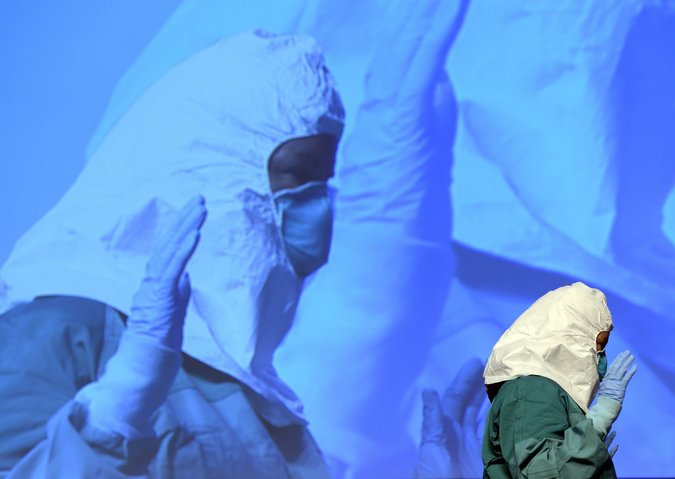
With good reason, Americans are deeply confused about the risks of Ebola. It is a frightening disease, made more so by dueling theories about how best to deal with people arriving from West Africa and by wildly different messages — based partly on erroneous information given out by New York City officials — about whether the doctor who returned to New York from treating patients in Guinea and came down with the disease was or was not a danger to others when he moved around the city.
To make matters worse, two ambitious governors — Chris Christie of New Jersey and Andrew Cuomo of New York — fed panic by imposing a new policy of mandatory quarantines for all health care workers returning from the Ebola-stricken countries of West Africa through John F. Kennedy and Newark Liberty international airports. There is absolutely no public health justification for mandatory quarantines.
It’s not surprising that they have started to adjust their earlier positions, which seemed politically motivated, as they have come under a barrage of criticism from public health experts for their dangerous overreaction. They now say they will allow health care workers to be confined to their own homes, where they will be checked twice a day by public health officials.
Lost in this grandstanding was one essential point. The danger to the public in New York in the case of Dr. Craig Spencer, who had worked in Guinea for Doctors Without Borders, was close to nonexistent. Health experts are virtually unanimous in declaring that people infected with the virus do not become contagious until after they develop a fever or other symptoms, such as diarrhea, vomiting, or severe headaches, at which time they need to be hospitalized and taken out of circulation.
Health care workers like Dr. Spencer know that it is in their interest to ensure that — if symptoms do arise — they get care quickly to improve their chances of survival and to reduce the risk of infecting their friends and families. Dr. Spencer reported his temperature promptly when it was a low-grade fever of a 100.3 degrees and was rushed to Bellevue Hospital Center for isolation and treatment while his fiancée and two friends were put into voluntary isolation.
Fortunately, for the public, there are clearer heads at the federal level than there are in the statehouses of New York and New Jersey. On Monday, strict new federal monitoring rules, announced by the Centers for Disease Control and Prevention last week, went into effect for travelers entering the United States from Guinea, Liberia and Sierra Leone. The rules are designed to avoid the confusion of state-by-state policies, give health workers and other travelers a clearer idea of what to expect and reassure the public that somebody is in charge. State and local health departments will contact travelers daily for 21 days after their departure from West Africa to check on their temperatures and other symptoms (21 days is the maximum period for symptoms to develop). If the returning health care workers fail to report as required, health officials will track them down using contact information they have provided upon entry.
The C.D.C. further refined this approach on Monday with additional guidelines recommending how people with direct exposure to Ebola patients or burials should be handled. A doctor at high risk of Ebola because he was exposed to a patient’s bodily fluids would be strongly advised — and, if necessary, even ordered by health authorities — to avoid traveling or congregating in public.
The problem with a mandatory quarantine, even if done at home, is that it can discourage heath care workers from volunteering to fight the virus at its source in West Africa. Doctors Without Borders, the nongovernmental organization that has led the battle there, typically sends its workers on arduous four- to six-week assignments. The risk of being quarantined for another 21 days upon return has already prompted some people to reduce their length of time in the field and may discourage others from volunteering in the first place.
An editorial published Monday in The New England Journal of Medicine cited estimates that tens of thousands of additional volunteers will be needed to control the epidemic and warned that a mandatory 21-day quarantine, for people who are not sick and may never become sick, would be “more destructive than beneficial.” Policies that will reduce the chances of recruiting additional volunteers — without actually protecting the public — will only make the Ebola crisis worse.